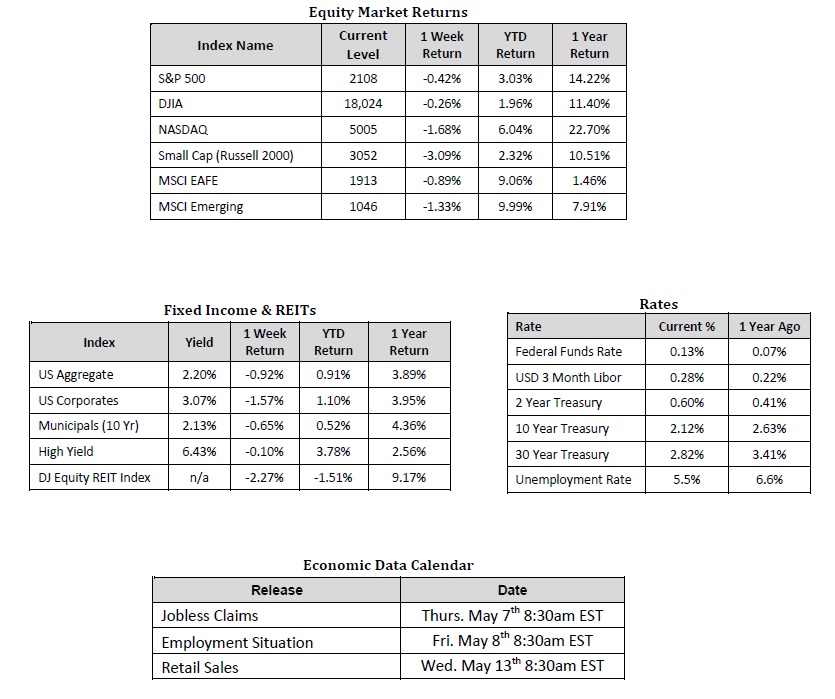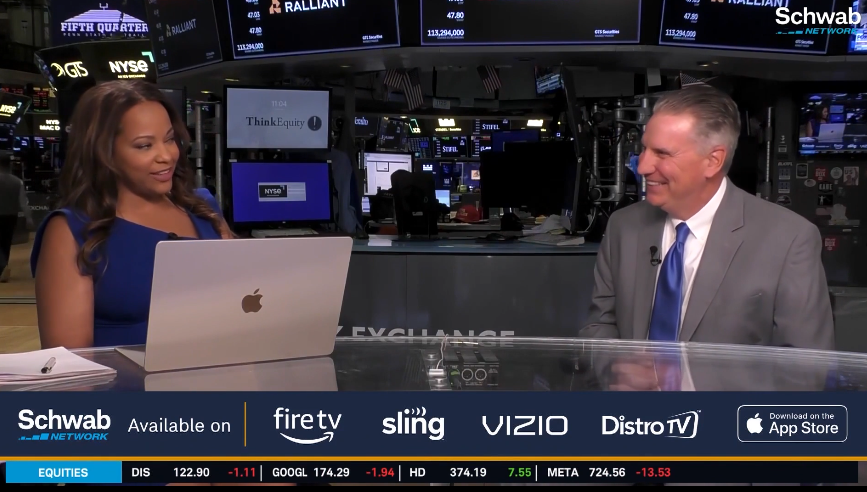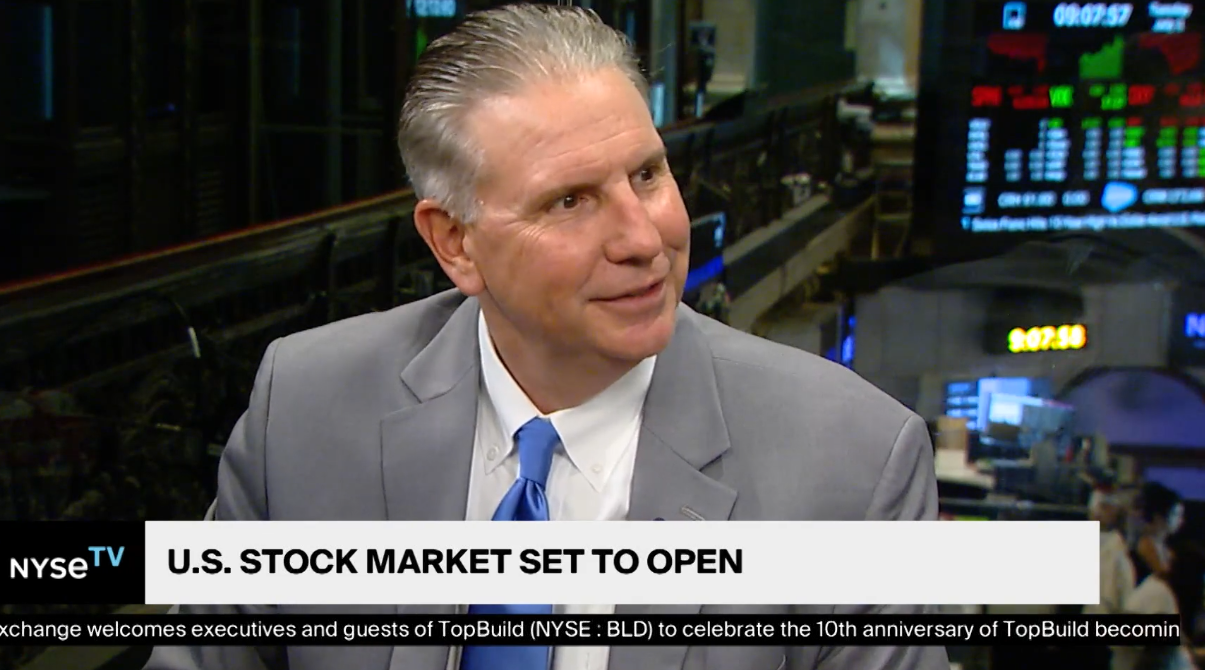
Capital Market Update – Week of 05/04/2015
Market Overview
Sources: Rates Data and Economic Calendar—Bloomberg Markets as of 5/4/15; Equity Market, Fixed Income and REIT returns from JP Morgan as of 5/1/15.
Happening Now
Oil Gains as Stocks Fall Across the Board
West Texas Intermediate Crude Oil (WTI) gained 3.5% last week as stocks around the world mostly fell in value while yields rose. The S&P 500 Index lost -0.4%, the S&P 400 Mid Cap Index lost -1.3%, and the Russell 2000 Index declined -3.1% matching the small cap index’s largest weekly loss since October 2014. Facing a weaker Dollar/stronger Euro, European stocks as measured by the Euro Stoxx 50 Index lost -2.7%. The dollar has now fallen 6 of the last 7 weeks relative to the Euro and currently is trading for $1.1135, the weakest it has been since February. On the Fixed Income front, yields on the 10 Year U.S. Treasury rose above 2% and at the time of this writing are trading for 2.16%.
The capital market reactions discussed above seem to be in part a reflection of two important economic releases Wednesday. First, a weaker than anticipated GDP release showed the U.S. economy grew at a meager 0.2% in the first quarter of 2015. Secondly, the FOMC meeting announcement recognized the slowdown in economic activity while keeping the possibility of a June rate hike on the table by not explicitly stating it was unlikely at their next meeting, as it did in March.
On a positive note, housing numbers continue to show improvement. Pending home sales increased 11.1% year-over-year (y-o-y) in March, marking the 7th consecutive month of y-o-y growth. This follows an earlier release that showed existing home sales prices also increased in March by 6.1% y-o-y, the 6th consecutive month of y-o-y gains in this measure. Wells Fargo’s Chairman and CEO, John Stumpf is optimistic on the U.S. Market and in an interview with CNBC notes “ The housing market and demand for home loans are going to be better…” while cautioning “…although it won’t be a ‘boom’ time because of a few factors standing in the way.”
Important Information and Disclaimers
Past Performance is not a guarantee of future performance.
Investing in foreign securities presents certain risks not associated with domestic investments, such as currency fluctuation, political and economic instability, and different accounting standards. This may result in greater share price volatility. These risks are heightened in emerging markets.
There are special risks associated with an investment in real estate, including credit risk, interest rate fluctuations and the impact of varied economic conditions. Distributions from REIT investments are taxed at the owner’s tax bracket.
The prices of small company and mid cap stocks are generally more volatile than large company stocks. They often involve higher risks because smaller companies may lack the management expertise, financial resources, product diversification and competitive strengths to endure adverse economic conditions.
Investing in commodities is not suitable for all investors. Exposure to the commodities markets may subject an investment to greater share price volatility than an investment in traditional equity or debt securities. Investments in commodities may be affected by changes in overall market movements, commodity index volatility, changes in interest rates or factors affecting a particular industry or commodity.
Products that invest in commodities may employ more complex strategies which may expose investors to additional risks.
Investing in fixed income securities involves certain risks such as market risk if sold prior to maturity and credit risk especially if investing in high yield bonds, which have lower ratings and are subject to greater volatility. All fixed income investments may be worth less than original cost upon redemption or maturity. Bond Prices fluctuate inversely to changes in interest rates. Therefore, a general rise in interest rates can result in the decline of the value of your investment.
Definitions
MSCI- EAFE: The Morgan Stanley Capital International Europe, Australasia and Far East Index, a free float-adjusted market capitalization index that is designed to measure developed-market equity performance, excluding the United States and Canada.
MSCI-Emerging Markets: The Morgan Stanley Capital International Emerging Market Index, is a free float-adjusted market capitalization index that is designed to measure the performance of global emerging markets of about 25 emerging economies.
Russell 3000: The Russell 3000 measures the performance of the 3000 largest US companies based on total market capitalization and represents about 98% of the investible US Equity market.
ML BOFA US Corp Mstr [Merill Lynch US Corporate Master]: The Merrill Lynch Corporate Master Market Index is a statistical composite tracking the performance of the entire US corporate bond market over time.
ML Muni Master [Merill Lynch US Corporate Master]: The Merrill Lynch Municipal Bond Master Index is a broad measure of the municipal fixed income market.
Investors cannot directly purchase any index.
LIBOR, London Interbank Offered Rate, is the rate of interest at which banks offer to lend money to one another in the wholesale money markets in London.
The Dow Jones Industrial Average is an unweighted index of 30 “blue-chip” industrial U.S. stocks.
The S&P Midcap 400 Index is a capitalization-weighted index measuring the performance of the mid-range sector of the U.S. stock market, and represents approximately 7% of the total market value of U.S. equities. Companies in the Index fall between S&P 500 Index and the S&P SmallCap 600 Index in size: between $1-4 billion.
DJ Equity REIT Index represents all publicly traded real estate investment trusts in the Dow Jones U.S. stock universe classified as Equity REITs according to the S&P Dow Jones Indices REIT Industry Classification Hierarchy. These companies are REITSs that primarily own and operate income-producing real estate.




